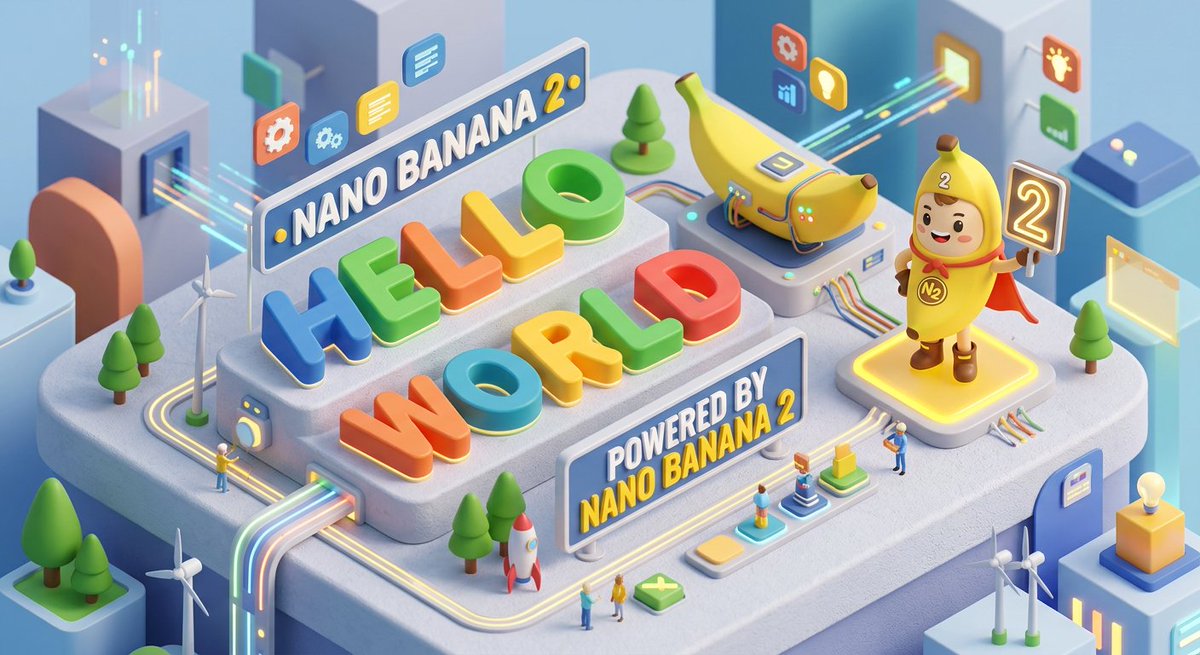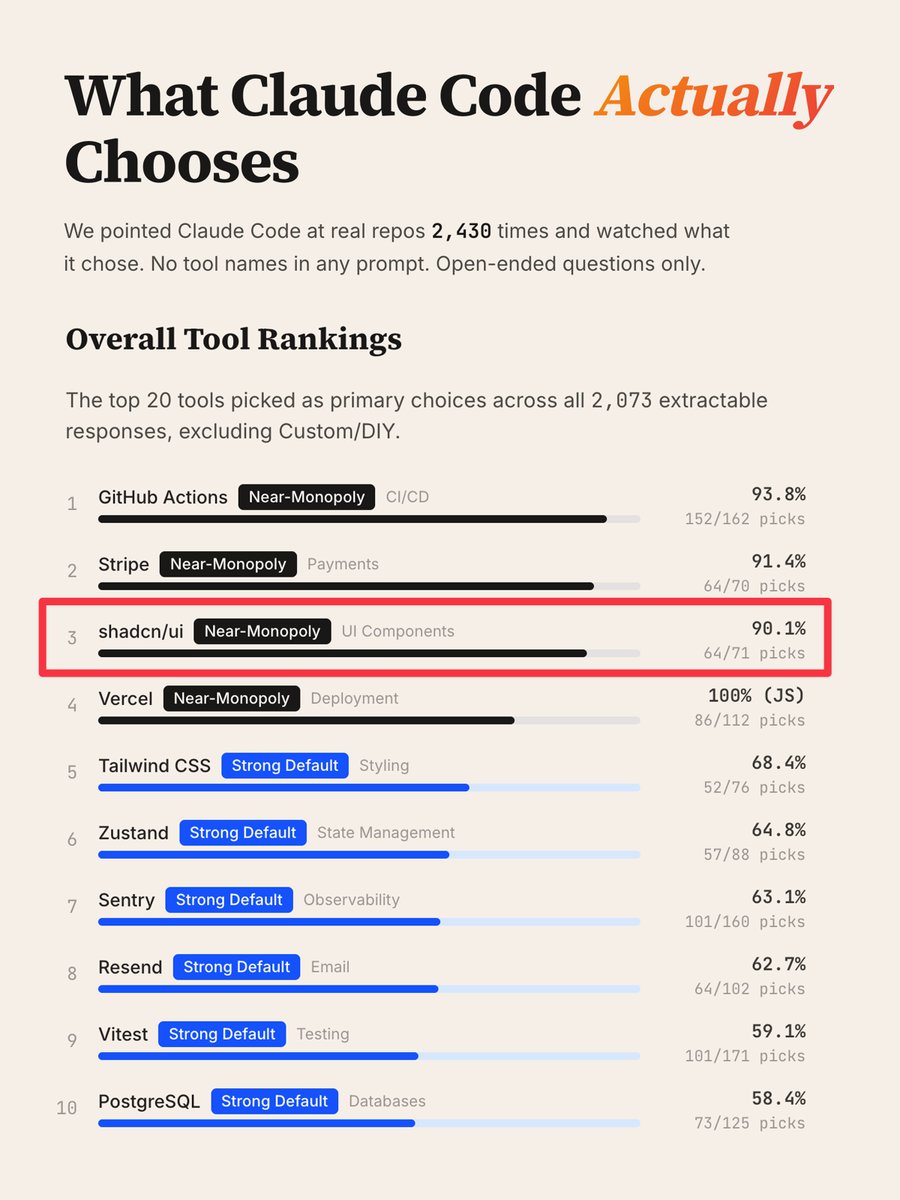Machine learning
Frequently Asked Questions
Introducing Nano Banana 2, our best image model yet 🍌🍌 It uses Gemini’s understanding of the world and is powered by real-time information and images from web search. That means it can better reflect real-world conditions in high-fidelity. Check out "Window Seat," a demo using Nano Banana 2’s world understanding to generate more accurate views from any window in the world, pulling live local weather info with 2K/4K specs. The precision is mind blowing. Rolling out today as the new default in the @Geminiapp, Search (across 141 countries), and Flow + available in preview via @GoogleAIStudio and Vertex AI. Also available in Google @Antigravity.

It is hard to communicate how much programming has changed due to AI in the last 2 months: not gradually and over time in the "progress as usual" way, but specifically this last December. There are a number of asterisks but imo coding agents basically didn’t work before December and basically work since - the models have significantly higher quality, long-term coherence and tenacity and they can power through large and long tasks, well past enough that it is extremely disruptive to the default programming workflow. Just to give an example, over the weekend I was building a local video analysis dashboard for the cameras of my home so I wrote: “Here is the local IP and username/password of my DGX Spark. Log in, set up ssh keys, set up vLLM, download and bench Qwen3-VL, set up a server endpoint to inference videos, a basic web ui dashboard, test everything, set it up with systemd, record memory notes for yourself and write up a markdown report for me”. The agent went off for ~30 minutes, ran into multiple issues, researched solutions online, resolved them one by one, wrote the code, tested it, debugged it, set up the services, and came back with the report and it was just done. I didn’t touch anything. All of this could easily have been a weekend project just 3 months ago but today it’s something you kick off and forget about for 30 minutes. As a result, programming is becoming unrecognizable. You’re not typing computer code into an editor like the way things were since computers were invented, that era is over. You're spinning up AI agents, giving them tasks *in English* and managing and reviewing their work in parallel. The biggest prize is in figuring out how you can keep ascending the layers of abstraction to set up long-running orchestrator Claws with all of the right tools, memory and instructions that productively manage multiple parallel Code instances for you. The leverage achievable via top tier "agentic engineering" feels very high right now. It’s not perfect, it needs high-level direction, judgement, taste, oversight, iteration and hints and ideas. It works a lot better in some scenarios than others (e.g. especially for tasks that are well-specified and where you can verify/test functionality). The key is to build intuition to decompose the task just right to hand off the parts that work and help out around the edges. But imo, this is nowhere near "business as usual" time in software.
I'm Boris and I created Claude Code. I wanted to quickly share a few tips for using Claude Code, sourced directly from the Claude Code team. The way the team uses Claude is different than how I use it. Remember: there is no one right way to use Claude Code -- everyones' setup is different. You should experiment to see what works for you!
the truth is no matter how hard you try you’ll never be able to keep up with 100% of what’s going on in AI right now there’s just too much action right now
We shipped Claude Code as a research preview a year ago today. Developers have used it to build weekend projects, ship production apps, write code at the world's largest companies, and help plan a Mars rover drive. We built it, and you showed us what it was for.

Bought a new Mac mini to properly tinker with claws over the weekend. The apple store person told me they are selling like hotcakes and everyone is confused :) I'm definitely a bit sus'd to run OpenClaw specifically - giving my private data/keys to 400K lines of vibe coded monster that is being actively attacked at scale is not very appealing at all. Already seeing reports of exposed instances, RCE vulnerabilities, supply chain poisoning, malicious or compromised skills in the registry, it feels like a complete wild west and a security nightmare. But I do love the concept and I think that just like LLM agents were a new layer on top of LLMs, Claws are now a new layer on top of LLM agents, taking the orchestration, scheduling, context, tool calls and a kind of persistence to a next level. Looking around, and given that the high level idea is clear, there are a lot of smaller Claws starting to pop out. For example, on a quick skim NanoClaw looks really interesting in that the core engine is ~4000 lines of code (fits into both my head and that of AI agents, so it feels manageable, auditable, flexible, etc.) and runs everything in containers by default. I also love their approach to configurability - it's not done via config files it's done via skills! For example, /add-telegram instructs your AI agent how to modify the actual code to integrate Telegram. I haven't come across this yet and it slightly blew my mind earlier today as a new, AI-enabled approach to preventing config mess and if-then-else monsters. Basically - the implied new meta is to write the most maximally forkable repo and then have skills that fork it into any desired more exotic configuration. Very cool. Anyway there are many others - e.g. nanobot, zeroclaw, ironclaw, picoclaw (lol @ prefixes). There are also cloud-hosted alternatives but tbh I don't love these because it feels much harder to tinker with. In particular, local setup allows easy connection to home automation gadgets on the local network. And I don't know, there is something aesthetically pleasing about there being a physical device 'possessed' by a little ghost of a personal digital house elf. Not 100% sure what my setup ends up looking like just yet but Claws are an awesome, exciting new layer of the AI stack.
Excited to announce Claude for Open Source ❤️ We're giving 6 months of free Claude Max 20x to open source maintainers and core contributors. If you maintain a popular project or contribute across open source, please apply! https://claude.com/contact-sales/claude-…

Claude for Open Source | Claude by Anthropic
Say hello to Nano Banana 2, our best image generation and editing model! 🍌 You can access Nano Banana 2 through AI Studio and the Gemini API under the name Gemini 3.1 Flash Image. We are also introducing new resolutions (lower cost) and tools like Image Search!

New @openclaw beta bits are up! External Secrets Management (openclaw secrets), CP thread-bound agents (first-class runtime), web socket support for codex and loads more! https://github.com/openclaw/openclaw/rel…
Releases · openclaw/openclaw
The one skill everyone who uses AI needs to master in 2026 Meta-prompting: using an LLM to generate, refine, and improve the very prompts you use to get work done. https://garryslist.org/posts/metaprompti…

Metaprompting is a skill everyone who uses AI needs to master in 2026
What is a non-obvious, meaningful way that you've... 1. Automated a boring part of your daily knowledge work 2. Found an insight from messy or scattered data 3. Stumbled onto something joyful ... due to AI assistants, agents, OpenClaw, et al.? (slop bot replies pls spare me)
In November, we outlined our approach to deprecating and preserving older Claude models. We noted we were exploring keeping certain models available to the public post-retirement, and giving past models a way to pursue their interests. With Claude Opus 3, we’re doing both.
A few random notes from claude coding quite a bit last few weeks. Coding workflow. Given the latest lift in LLM coding capability, like many others I rapidly went from about 80% manual+autocomplete coding and 20% agents in November to 80% agent coding and 20% edits+touchups in December. i.e. I really am mostly programming in English now, a bit sheepishly telling the LLM what code to write... in words. It hurts the ego a bit but the power to operate over software in large "code actions" is just too net useful, especially once you adapt to it, configure it, learn to use it, and wrap your head around what it can and cannot do. This is easily the biggest change to my basic coding workflow in ~2 decades of programming and it happened over the course of a few weeks. I'd expect something similar to be happening to well into double digit percent of engineers out there, while the awareness of it in the general population feels well into low single digit percent. IDEs/agent swarms/fallability. Both the "no need for IDE anymore" hype and the "agent swarm" hype is imo too much for right now. The models definitely still make mistakes and if you have any code you actually care about I would watch them like a hawk, in a nice large IDE on the side. The mistakes have changed a lot - they are not simple syntax errors anymore, they are subtle conceptual errors that a slightly sloppy, hasty junior dev might do. The most common category is that the models make wrong assumptions on your behalf and just run along with them without checking. They also don't manage their confusion, they don't seek clarifications, they don't surface inconsistencies, they don't present tradeoffs, they don't push back when they should, and they are still a little too sycophantic. Things get better in plan mode, but there is some need for a lightweight inline plan mode. They also really like to overcomplicate code and APIs, they bloat abstractions, they don't clean up dead code after themselves, etc. They will implement an inefficient, bloated, brittle construction over 1000 lines of code and it's up to you to be like "umm couldn't you just do this instead?" and they will be like "of course!" and immediately cut it down to 100 lines. They still sometimes change/remove comments and code they don't like or don't sufficiently understand as side effects, even if it is orthogonal to the task at hand. All of this happens despite a few simple attempts to fix it via instructions in CLAUDE . md. Despite all these issues, it is still a net huge improvement and it's very difficult to imagine going back to manual coding. TLDR everyone has their developing flow, my current is a small few CC sessions on the left in ghostty windows/tabs and an IDE on the right for viewing the code + manual edits. Tenacity. It's so interesting to watch an agent relentlessly work at something. They never get tired, they never get demoralized, they just keep going and trying things where a person would have given up long ago to fight another day. It's a "feel the AGI" moment to watch it struggle with something for a long time just to come out victorious 30 minutes later. You realize that stamina is a core bottleneck to work and that with LLMs in hand it has been dramatically increased. Speedups. It's not clear how to measure the "speedup" of LLM assistance. Certainly I feel net way faster at what I was going to do, but the main effect is that I do a lot more than I was going to do because 1) I can code up all kinds of things that just wouldn't have been worth coding before and 2) I can approach code that I couldn't work on before because of knowledge/skill issue. So certainly it's speedup, but it's possibly a lot more an expansion. Leverage. LLMs are exceptionally good at looping until they meet specific goals and this is where most of the "feel the AGI" magic is to be found. Don't tell it what to do, give it success criteria and watch it go. Get it to write tests first and then pass them. Put it in the loop with a browser MCP. Write the naive algorithm that is very likely correct first, then ask it to optimize it while preserving correctness. Change your approach from imperative to declarative to get the agents looping longer and gain leverage. Fun. I didn't anticipate that with agents programming feels *more* fun because a lot of the fill in the blanks drudgery is removed and what remains is the creative part. I also feel less blocked/stuck (which is not fun) and I experience a lot more courage because there's almost always a way to work hand in hand with it to make some positive progress. I have seen the opposite sentiment from other people too; LLM coding will split up engineers based on those who primarily liked coding and those who primarily liked building. Atrophy. I've already noticed that I am slowly starting to atrophy my ability to write code manually. Generation (writing code) and discrimination (reading code) are different capabilities in the brain. Largely due to all the little mostly syntactic details involved in programming, you can review code just fine even if you struggle to write it. Slopacolypse. I am bracing for 2026 as the year of the slopacolypse across all of github, substack, arxiv, X/instagram, and generally all digital media. We're also going to see a lot more AI hype productivity theater (is that even possible?), on the side of actual, real improvements. Questions. A few of the questions on my mind: - What happens to the "10X engineer" - the ratio of productivity between the mean and the max engineer? It's quite possible that this grows *a lot*. - Armed with LLMs, do generalists increasingly outperform specialists? LLMs are a lot better at fill in the blanks (the micro) than grand strategy (the macro). - What does LLM coding feel like in the future? Is it like playing StarCraft? Playing Factorio? Playing music? - How much of society is bottlenecked by digital knowledge work? TLDR Where does this leave us? LLM agent capabilities (Claude & Codex especially) have crossed some kind of threshold of coherence around December 2025 and caused a phase shift in software engineering and closely related. The intelligence part suddenly feels quite a bit ahead of all the rest of it - integrations (tools, knowledge), the necessity for new organizational workflows, processes, diffusion more generally. 2026 is going to be a high energy year as the industry metabolizes the new capability.
We’re launching Nano Banana 2, built on the latest Gemini Flash model. 🍌 It’s state-of-the-art for creating and editing images, combining Pro-level capabilities with lightning-fast speed. 🧵

More than a billion images generated later, we love seeing what you create with Nano Banana. Today, we’re inviting more people to join in on the fun with the launch of 🍌Nano Banana 2🍌 This state-of-the-art model is exceptionally good at things like: — Creating images that tap into the Gemini model’s real-world knowledge base + are powered by information and images from web search to more accurately render specific landmarks, locations, objects, and beyond — Adapting creative assets for global markets with regionally relevant localization — Dynamically editing aspect ratios and upscaling to 2k and 4k resolutions — Generating multiple cohesive images that fit together in one world, story, or concept

.@polymath_labs is training world generation models to automate the creation of RL environments. Traditionally, RL environment generation has been bottlenecked by human data. Superintelligence will never be achieved by human data alone. Polymath is building the core technology to enable automated environment generation using far less human effort than traditionally required, and eventually none. This allows for more complex and realistic worlds, and higher quality, scale, and diversity of tasks. This will be essential to unlock RL scaling. The end goal is to create large-scale, long-horizon environments from a text description alone. This will enable the creation of worlds of arbitrary complexity and scale, which is foundational for training & evaluating autonomous, superintelligent AI agents. Congrats on the launch, @dylanma5621 and @narenyenuganti! https://ycombinator.com/launches/PYT-pol…

Anthropic has acquired @Vercept_ai to advance Claude’s computer use capabilities. Read more: https://anthropic.com/news/acquires-verc…
Anthropic acquires Vercept to advance Claude's computer use capabilities

